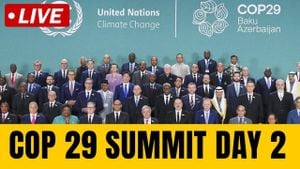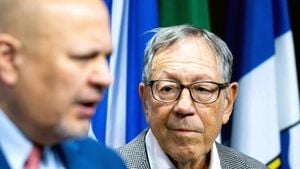On the vibrant sidelines of the G20 Summit held in Rio de Janeiro, India and the United Kingdom charted a hopeful new course for their economic partnership. Prime Minister Narendra Modi met with UK Prime Minister Keir Starmer for what marked their first face-to-face interaction since Starmer took office following the Labour Party's resounding electoral victory earlier this year. The anticipation surrounding this meeting was evident, as the two leaders explored pivotal issues affecting both nations, particularly the resumption of free trade agreement (FTA) discussions.
Prime Minister Modi was quick to extend his congratulations to Starmer on his election, emphasizing the importance of this bilateral relationship. Likewise, Starmer reciprocated with warm wishes for Modi on his historic third term as India’s Prime Minister. The camaraderie was palpable as both leaders acknowledged the advancements made under the India-UK Comprehensive Strategic Partnership, focusing on sectors including trade, technology, and green finance.
One of the highlights of their meeting was the announcement by Starmer about the relaunch of UK-India trade talks scheduled for 2025. His office stated, "The UK will seek a new strategic partnership with India, including a trade agreement, as well as deepening cooperation in areas like security, education, technology, and climate change." This renewed focus on trade is seen as pivotal for the UK’s economic strategy, especially as the nation aims to fortify its position globally.
Modi and Starmer emphasized their commitment to improving the opportunities available through the forthcoming FTA. The Indian Prime Minister expressed confidence in the negotiating teams’ ability to address and resolve outstanding issues to create a balanced and mutually beneficial agreement. Modi articulated, "For India, the Comprehensive Strategic Partnership with the UK is of immense priority. We want to add strength to trade as well as cultural linkages."
Adding substance to their commitment, Modi announced the establishment of two new Indian consulates—one each in Belfast and Manchester. This strategic move aims to ease consular assistance for the growing Indian diaspora within the region and strengthen bilateral ties through improved governance.
Another pressing topic they touched upon was the need to address issues surrounding economic offenders, hinting at high-profile cases like Nirav Modi and Vijay Mallya. Prime Minister Modi pointed out the significance of managing these complicated matters, aiming to expedite the process of their extradition back to India. This showcases the seriousness both leaders have toward enhancing lawful and efficient economic exchanges.
The meeting was not just about trade; it also served as a platform for broader discussions encompassing international concerns and regional stability. Both leaders reaffirmed their commitment to working closely on pressing global issues, leveraging their strategic partnership to create lasting impacts both domestically and internationally.
Starmer echoed these sentiments, stating, "A new trade deal with India will support jobs and prosperity in the UK—representing a step forward in our mission to deliver growth and opportunity across our country." He noted the importance of the upcoming FTA discussions, emphasizing the UK’s growing economic ties with India, which has now become the fifth largest economy globally.
The bilateral trade between the UK and India was valued at around £42 billion for the year leading up to June 2024, with UK exports to India reaching £16.6 billion. Starmer's government is optimistic about the potential benefits of this relationship, which could significantly bolster both economies. Modi also mentioned the necessity of quickened discussions going forward, guiding his ministers and senior officials to facilitate effective implementation of the insights and agreements reached.
Prior to the G20 Summit, Modi's visit to Nigeria had already underscored his intent to engage deeply on multiple fronts with various leaders. His proactive diplomacy at the summit reflects India's aspiration to expand its role on the global stage, aligning itself with major economies and fostering partnerships aimed at growth and technological advancement.
Following their productive meeting, Modi tweeted, "Had an extremely productive meeting with Prime Minister Keir Starmer. We are eager to work closely in areas such as technology, green energy, security, and innovation. The opportunities for enhancing trade and cultural ties are manifold, and I am optimistic about our future collaborations."
The meeting's outcomes bolster hopes for enhanced cooperation across various arenas between India and the UK and set the stage for fruitful dialogues leading to tangible agreements.
Indeed, the G20 Summit has provided Modi and Starmer with the perfect backdrop to reinforce their commitment to their shared goals. While challenges still exist, the tone and mutual appreciation expressed during their discussions suggest both leaders understand the significant potential lying within their partnership.



